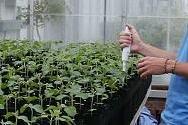 The legume-rhizobium symbiosis is a classic example of mutualism. Leguminous host plants trade carbohydrates for the nitrogen fixed by their rhizobium symbionts. In collaboration with Katy Heath (U. of Illinois), we are investigating how long-term nitrogen addition treatments at the KBS LTER have influenced the ecology and evolution of rhizobium populations and their Trifolium host plants. Nitrogen-rich environments have been hypothesized to shift the legume-rhizobium mutualism towards parasitism because plants can obtain nitrogen more efficiently from the abiotic environment than from their rhizobium symbionts. We find that long-term nitrogen addition experiments have caused the evolution of less mutualistic rhizobia (Weese et al. 2015), that horizontal gene transfer has contributed to the evolution of less cooperative rhizobia (Gordon et al. 2016), and have identified the genes underlying these evolutionary responses (Klinger et al. 2016). Our current work investigates the ecological consequences of these evolutionary changes and how the evolution of reduced cooperation influences pollinators, herbivores, and soil nitrogen availability.
The legume-rhizobium symbiosis is a classic example of mutualism. Leguminous host plants trade carbohydrates for the nitrogen fixed by their rhizobium symbionts. In collaboration with Katy Heath (U. of Illinois), we are investigating how long-term nitrogen addition treatments at the KBS LTER have influenced the ecology and evolution of rhizobium populations and their Trifolium host plants. Nitrogen-rich environments have been hypothesized to shift the legume-rhizobium mutualism towards parasitism because plants can obtain nitrogen more efficiently from the abiotic environment than from their rhizobium symbionts. We find that long-term nitrogen addition experiments have caused the evolution of less mutualistic rhizobia (Weese et al. 2015), that horizontal gene transfer has contributed to the evolution of less cooperative rhizobia (Gordon et al. 2016), and have identified the genes underlying these evolutionary responses (Klinger et al. 2016). Our current work investigates the ecological consequences of these evolutionary changes and how the evolution of reduced cooperation influences pollinators, herbivores, and soil nitrogen availability.